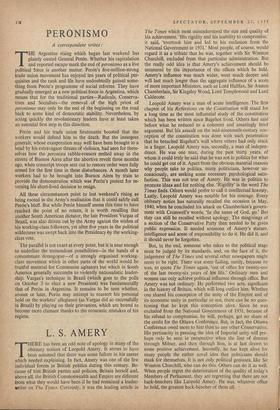PERONISMO
A correspondent writes : THE Argentine rising which began last weekend has plainly ousted General Pen5n. Whether his capitulation and reported escape mark the end of peronismo as a live political force is another matter. Peron's five-million-strong trade union movement has enjoyed ten years of political per- quisites and the rank and file have undoubtedly gained some- thing from Peron's programme of social reforms. They have gradually emerged as a new political force in Argentina, which means that for the traditional parties—Radicals, Conserva- tives and Socialists—the removal of the high priest of peronismo may only be the end of the beginning on the road back to some kind of democratic stability. Nevertheless, by acting quickly the revolutionary leaders have at least taken an essential first step in this direction.
Peron and his trade union lieutenants boasted that the workers would defend him to the death. But the insurgent generals, whose exasperation may well have been brought to a head by his extravagant threats of violence, had seen for them- selves how the peronista rabble-rousers melted away in the streets of Buenos Aires after the abortive revolt three months ago, when conscript troops sent out to restore order were fully armed for the first time in these disturbances. A month later workers had to be brought into Buenos Aires by train to provide the demonstration which was Peron's pretext for re- versing his short-lived decision to resign.
All these circumstances point to last weekend's rising as being rooted in the Army's realisation that it could safely call Peron's bluff. But while Peron himself seems this time to have reached the point of no return, it is worth recalling that another South American dictator, the late President Vargas of Brazil, was also driven out by the Army against the wishes of his working-class followers, yet after five years in the political wilderness was swept back into the Presidency by the working- class vote.
The parallel is not exact at every point, but it is near enough to underline the tremendous possibilities—in the hands of a consummate demagogue—of a strongly organised working- class movement which in other parts of the world would be fruitful material for Communist agitators but which in South America generally succumbs to violently nationalistic leader- ship. Vargas's technique in Brazil (which goes to the polls on October 3 to elect a new President) was fundamentally that of Per6n in Argentina. It remains to be seen whether, sooner or later, Peron may attempt to reassert his personal hold on the workers' allegiance (as Vargas did so successfully in Brazil) by playing on their grievances, which are bound to become more clamant thanks /to the economic mistakes of his regime.
































 Previous page
Previous page